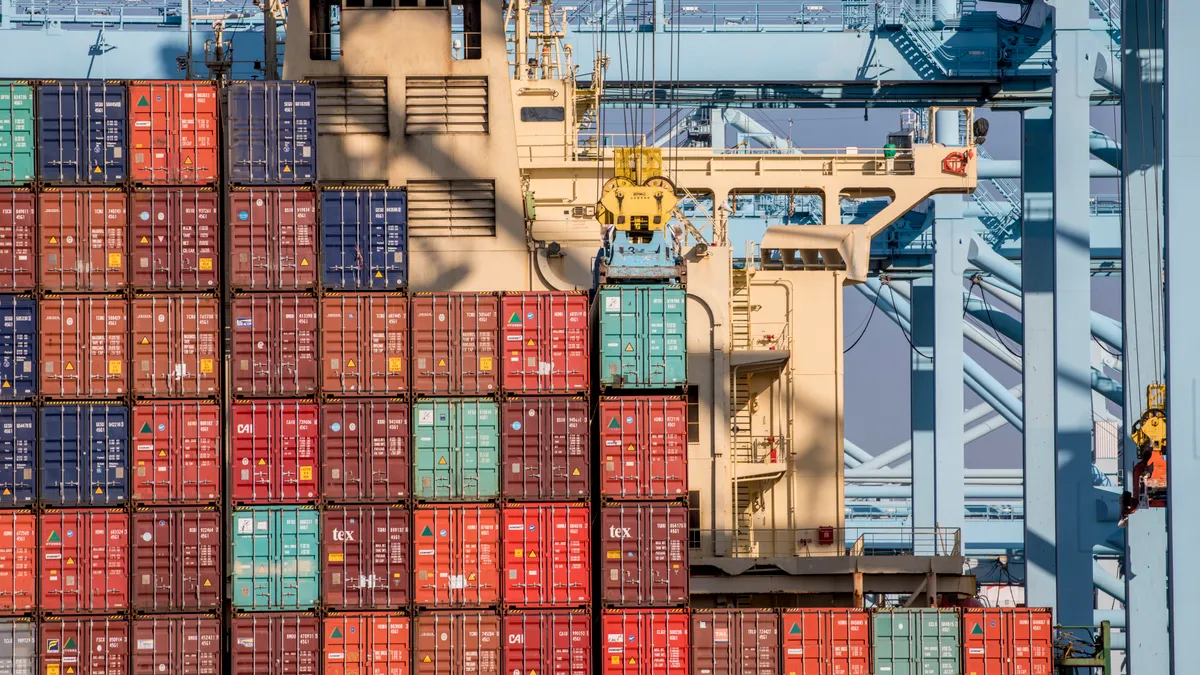Dive Brief:
- At 35% of ports, the coronavirus outbreak and response efforts have increased demand for warehouse storage for food and medical supplies, according to a survey of 90 global ports conducted by the World Ports Sustainability Program (WPSP).
- While some ports are managing increased imports and stockpiling of essential goods, others are adjusting to a decrease in storage utilization for conventional cargo, according to the survey.
- Forty percent of ports surveyed have experienced a moderate decrease in port calls, defined as a drop between 5% and 10%. Another 14% of ports have seen a 25% drop in port calls, the survey found.
Dive Insight:
As the demand for medical supplies and food increases across the world, the demand for storage of these items will grow. The survey results suggest ports are managing some of this increase. In Los Angeles, the port's Executive Director Gene Seroka is leading an effort to match medical supplies with health care providers in the area.
"As storage increases, ports are now looking to provide additional storage facilities in and around port areas," a spokesperson for WPSP told Supply Chain Dive in an email. "This may include land used for other purposes or in cooperation with the private sector to improve cargo flows."
One of the biggest headaches for ports is the pile up of cars. "As dealers fail to collect their new cars (due to a collapse in sale), overcrowding of relevant storage areas near some quaysides has been reported," WPSP wrote in its report.
But some ports have been able to avoid these issues.
"[N]othing here to report," Joe Harris, a spokesperson for The Port of Virginia told Supply Chain Dive in an email when asked if the port was experiencing changes in storage demand.
But the uptick in blank sailings issued by carriers has resulted in operational changes at ports across the country. There have been 435 sailings canceled in 2020, which works out to a demand drop of 7 Million TEUs, according to the latest numbers from Sea-Intelligence. The result has been a decrease in volume at ports around the world.
The volume decrease led The Port of Virginia to announce plans to stop operations at its Portsmouth Marine Terminal (PMT) starting May 4. Multiple ports have taken similar steps to shift operations to account for changes resulting from the coronavirus outbreak.
"Our decision is also supported by the fact that we do not have the container volume at PMT to justify continuing operations there," Harris said. "This is one of many cost-savings measures being taken at The Port of Virginia."
The decision to close PMT was a consideration before the coronavirus began to impact the shipping industry and if demand recovers it would not take much effort to start operations again, he said.
The Port of Charleston announced last week it would not achieve its 2020 volume plan as a result of the pandemic and now expects to see a year-over-year drop in volume.
While ports remain open, 16% report a shortage of dock workers, according to the WPSP survey. "Overall though, disruptions have been limited with many ports being able to continue operations and remaining open for trade," WPSP wrote.
As the global shipping industry deals with hurdles created by the pandemic, "Supply Chain Innovation Teams" created by the Federal Maritime Commission have begun studying the challenges and looking for ways to address them, the agency announced last month.














